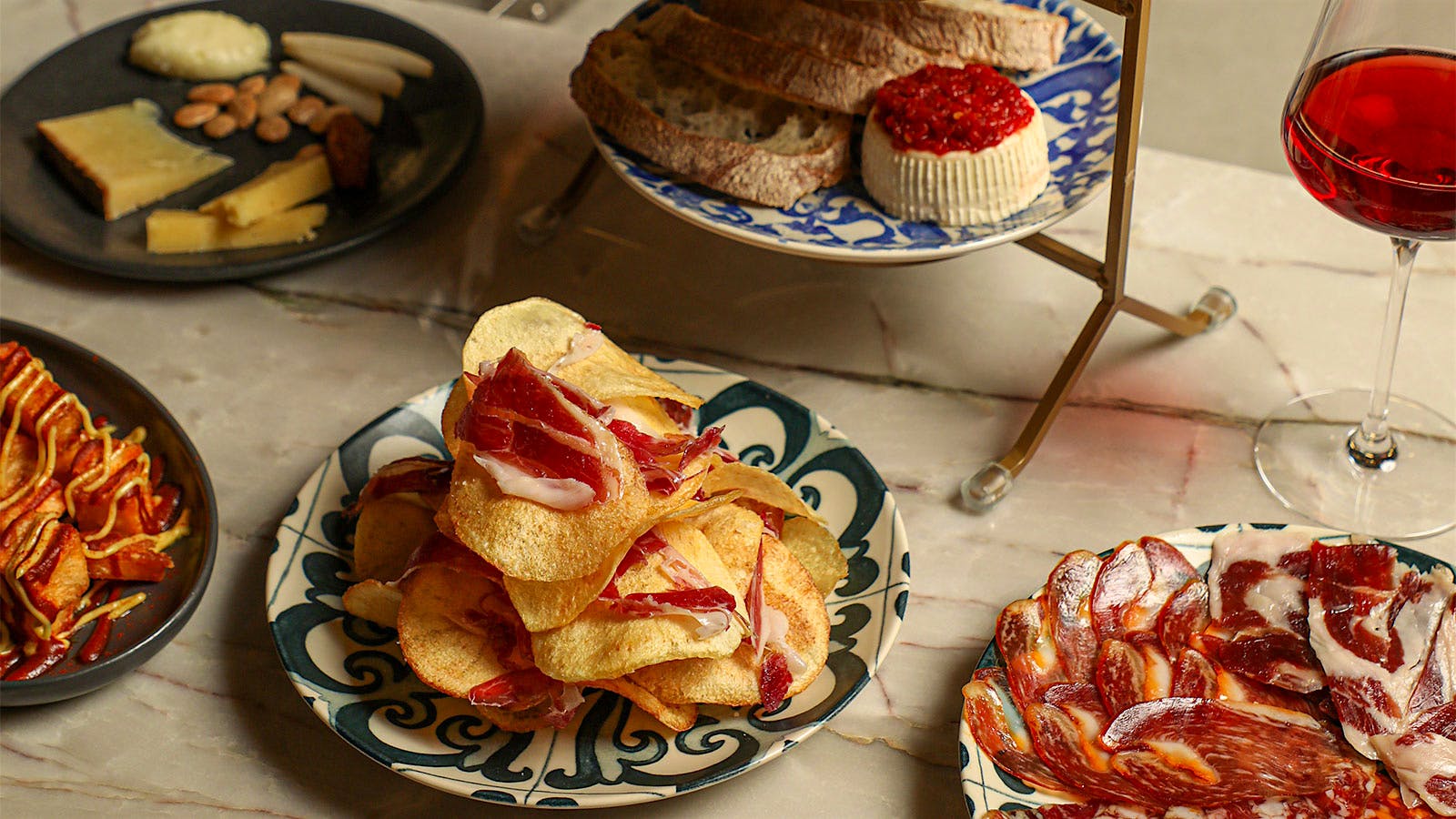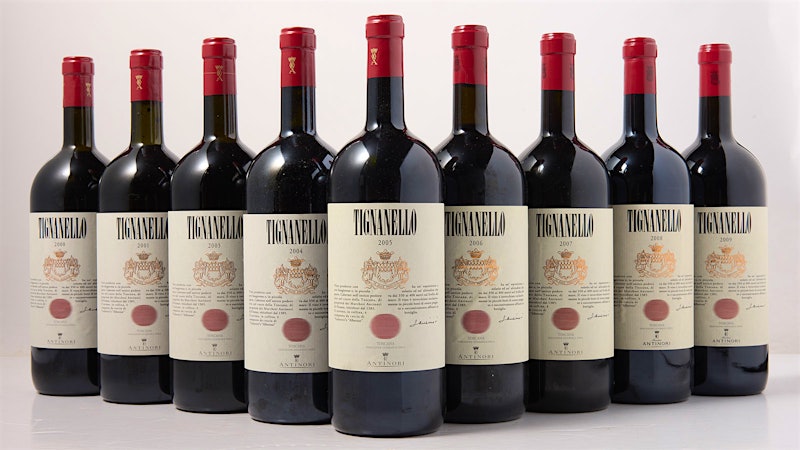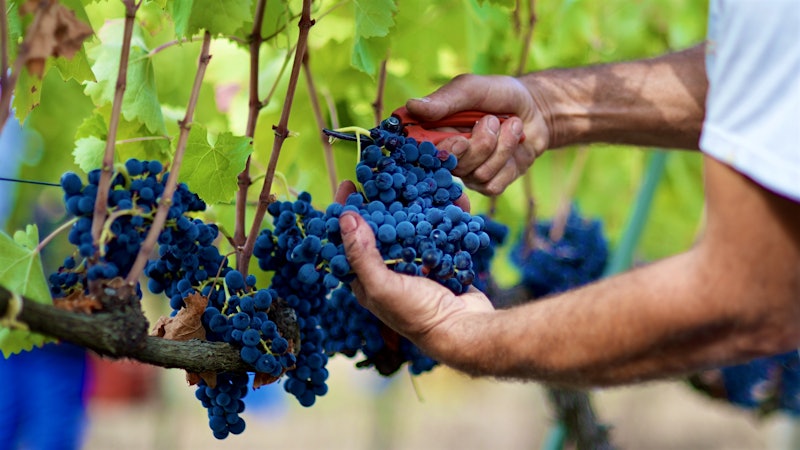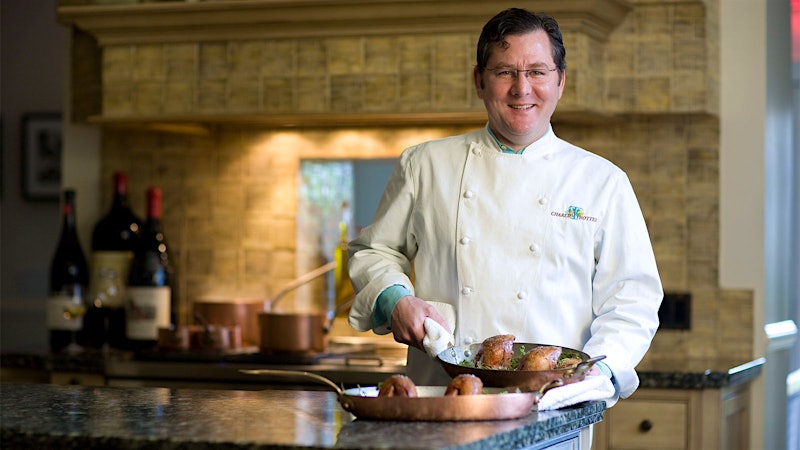Sometimes even the world’s best-known chefs need to return to their roots, and that includes Emeril Lagasse. The chef’s latest endeavor, 34 Restaurant & Bar, opened in New Orleans’ Warehouse District last month near his Grand Award–winning flagship Emeril’s, the restaurant that solidified Lagasse’s place as an icon of Creole cooking. But this new restaurant represents a significant shift: Lagasse opened it in homage to his late mother, Hilda Lagasse, and her Portuguese heritage, trading the andouille sausage for chouriço.
The new wine bar was brought to life with the help of Lagasse’s 21-year-old son, E.J. Lagasse, who has taken on a larger role at his father’s New Orleans restaurants over the past few years, helping with menu development at Emeril’s and now overseeing the kitchen there as patron chef. The new restaurant’s name nods to the full names of this father-and-son duo—Emeril John Lagasse III and IV—and their family legacy.
Inspired by the dining scenes of Lisbon and Porto, 34’s menu is filled with familiar favorites from Portuguese cooking: jamón croquetes with dollops of piri piri aioli, caldo verde simmered with smoky chouriço, and pastéis de bacalhau (crispy cod fritters). The Lagasses and their staff took several trips to Portugal to gather recipes and ideas, leading to dishes less often seen in the U.S., like a cataplana fish stew with hay-smoked halibut or porco Alentejana (braised pork with clams, a dish from Portugal's Alentejo region). There’s also the pica pau appetizer; Portuguese for “woodpecker,” this dish features small beef filet cuts drenched in a mustard and white wine sauce, and, true to its name, it’s eaten with toothpicks.
The Lagasses have also prepared a selection of shareable arroz dishes for the table, including a duck rice laced with chouriço and lardo and a classic Spanish paella studded with rabbit and Gulf shrimp.

The best spot in the house, according to sommelier Nicole Maddox, is at the “jamón bar,” where guests can peer into the kitchen. “It’s almost like a chef’s table experience, where you’re watching the whole kitchen and what they’re doing,” said Maddox. “[Sometimes] you get to see Emeril back there working the ‘expo,’ as well as chef E.J. and the others in the executive culinary team.”
At the bar, guests can enjoy Iberian cheeses and cured meats like chouriço, blood sausage and hand-sliced jamón Iberico. (A jamón master was flown in from Spain to teach both front and back of house how to properly slice and serve a full leg.) Diners can also order couvertes (snacks), including pan com tomate, as well as a heap of salt and vinegar chips layered with ribbons of jamòn.
A Portuguese Wine Wave
Throughout the wine list, Maddox and her team offer extensive notes for each bottle, introducing backstories, winemaking methods and tasting notes. According to her, this was done to assist guests unfamiliar with Portuguese wines. “It was also a practical choice—not everyone feels comfortable talking to a sommelier about wine,” Maddox explained.
“[The list] shares the history of the producers—even some of the more modern ones are playing around with the combination of traditional and modern methods,” Maddox continued. “They’ve just been doing their own thing … I love that Portuguese wines are really starting to become more prevalent.”
Some of Maddox’s favorite bottlings include those from lesser-known regions like Colares—a small coastal area filled with pre-phylloxera vines that “produce wines with rare intensity”—and from winemakers such as Susana Esteban, who ages her wines in a mix of amphora and oak. “Her wines have this elegance without pretense to them,” said Maddox. “There's nothing else like it in the world.”

Those already acquainted with Portuguese wines will find familiar names, like Vinho Verde’s Soalheiro and Alentejo’s Heredade de Esporão, as well as Niepoort’s table wines from Bairrada. The prices of these bottles are compelling, with most under $150. While the list features around 100 labels, Maddox expects it to expand quickly as more wines come to market, and there are plans to import restaurant-exclusive bottlings. Maddox also expects to host several winemaker dinners throughout the year. “We ended up having [a dinner with] Luis Pato on our opening day; he is considered the father of [the grape variety] Baga,” said Maddox.”
Creating a program like this is ambitious, even in a wine-loving city like New Orleans, but to Maddox, it’s a sign of a new wave: “There’s this new [vanguard] of sommeliers in New Orleans that have a reverence for the big names [in wine]; but we’re also really interested in what’s going to be the new thing. It’s becoming a very different wine city.”—Julia Larson
Southeast Asian Restaurant Twin Tails Debuts in New York
Who’s behind it: Twin Tails, a new Southeast Asian restaurant, opened at the Deutsche Bank Center in New York City last month, marking the 12th opening from leading hospitality group Quality Branded. It joins notable sibling restaurants such as Wine Spectator Award of Excellence winner Don Angie, Quality Bistro, Quality Italian, Quality Meats, Zou Zou’s and—just across the Deutsche Bank Center atrium—Bad Roman.
“It’s something my chef/partner Craig Koketsu and I have been talking about for over two decades,” Quality Branded CEO and founder Michael Stillman told Wine Spectator via email. “We’re both big fans of Southeast Asian cuisine, and we wanted to do a project like this when the time was right.”

The culinary approach: Koketsu draws influences from Vietnam and Thailand, as well as Cambodia and Laos, with a focus on shareable dishes. “I'm excited to be cooking this type of food,” said the chef. “I grew up in San Jose, a city with many Southeast Asian immigrants. (It has the largest population of Vietnamese people outside of Vietnam.) So I’ve loved this food from a young age.” Koketsu explained that authentic technique is vital to the culinary program: The Cho Lon duck is true to the original dish made in Bangkok’s Chinese community; the green papaya and kumquat salad is prepared with a mortar and pestle (at guests’ tables), as it would be in Thai street markets.
Smaller dishes on Koketsu’s menu include salmon crudo with green apple and coconut, peanut-ginger chicken satay, and spring and summer rolls. For larger plates, expect grilled dorade royale with a serrano-ginger dipping sauce, “shaking” beef (filet mignon prepared using a recipe from 1902), ribs with lemongrass and black pepper caramel and “twin” lobster noodles with garlic and chives. “I hope [this is] a place where groups can come and experience a ton of different flavors from a really impressive and expansive region of the world,” Koketsu added.
What’s on the wine list: Wine director Meng Chiang has assembled about 135 selections, representing a 1,200-bottle, primarily French inventory. “Rather than create an all-encompassing, international wine list, the breadth and reach of French wines made it a natural place to start,” said Chiang, who wanted the wine list to mirror the diversity of the Twin Tails menu. “In the end, we realized we didn't need to look much further.”
Loire Valley wines form a significant part of the list; Chiang sees the region’s whites and reds as “natural pairings” for Twin Tails’ cuisine. A section of Sancerre includes wineries like Alphonse Mellot, Pascal Jolivet and Vincent Gaudry. The Loire’s demi-sec whites are represented by domaines like Huet.

The other star is Bordeaux, with wines from across the region and older bottlings (at least 15 years old) from châteaus Beychevelle, Léoville Las Cases, Trotanoy, Gruaud-Larose and Lafite Rothschild.
The list is filled out with Champagnes and pét-nats, Châteauneuf-du-Pape from Château de Beaucastel and Burgundies from domaines like Patrick Piuze, plus wines from Alsace, Beaujolais, Jura, Languedoc and Provence.
The design: The 140-seat restaurant—located in the space formerly used by Andrew Carmellini’s A Voce—was designed by AvroKo (the leading firm behind several other recent openings). The space boasts “retro-futuristic” elements calling back to the 1980s, reclaimed brass doors, mirrored wall panels and neo-expressionist–influenced works from artists Jordy Kerwick and Melissa Monroe.—Collin Dreizen
Keep up with the latest restaurant news from our award winners: Subscribe to our free Private Guide to Dining newsletter!












